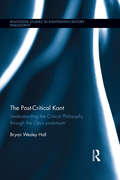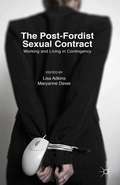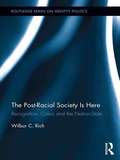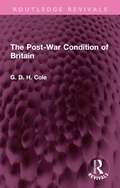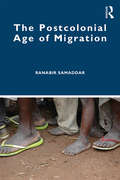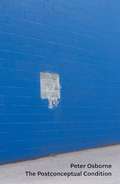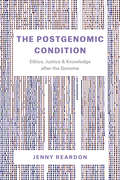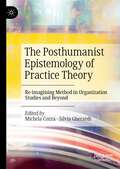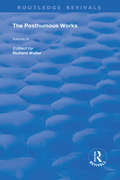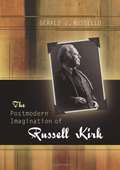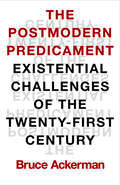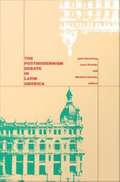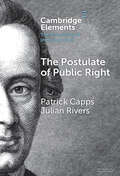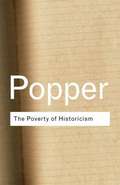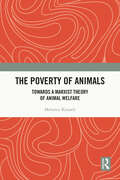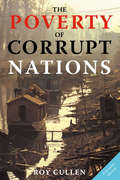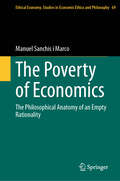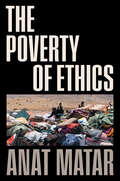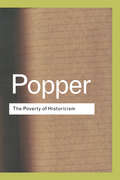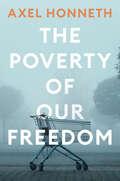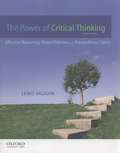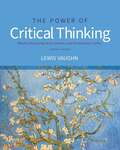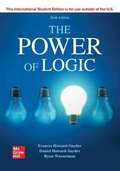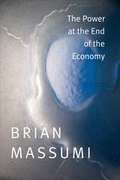- Table View
- List View
The Post-Critical Kant: Understanding the Critical Philosophy through the Opus Postumum (Routledge Studies in Eighteenth-Century Philosophy #10)
by Bryan HallIn this book, Bryan Wesley Hall breaks new ground in Kant scholarship, exploring the gap in Kant’s Critical philosophy in relation to his post-Critical work by turning to Kant’s final, unpublished work, the so-called Opus Postumum. Although Kant considered this project to be the "keystone" of his philosophical efforts, it has been largely neglected by scholars. Hall argues that only by understanding the Opus Postumum can we fully comprehend both Kant’s mature view as well as his Critical project. In letters from 1798, Kant claims to have discovered a "gap" in the Critical philosophy that requires effecting a "transition from the metaphysical foundations of natural science to physics"; unfortunately, Kant does not make clear exactly what this gap is or how the transition is supposed to fill the gap. To resolve these issues, Hall draws on the Opus Postumum, arguing that Kant’s transition project can solve certain perennial problems with the Critical philosophy. This volume provides a powerful alternative to all current interpretations of the Opus Postumum, arguing that Kant’s transition project is best seen as the post-Critical culmination of his Critical philosophy. Hall carefully examines the deep connections between the Opus Postumum and the view Kant develops in the Critique of Pure Reason, to suggest that properly understanding the post-Critical Kant will significantly revise our view of Kant’s Critical period.
The Post-Fordist Sexual Contract: Working and Living in Contingency
by Lisa Adkins Maryanne DeverThis collection analyzes shifting relationships between gender and labour in post-Fordist times. Contingency creates a sexual contract in which attachments to work, mothering, entrepreneurship and investor subjectivity are the new regulatory ideals for women over a range of working arrangements, and across classed and raced dimensions.
The Post-Racial Society is Here: Recognition, Critics and the Nation-State (Routledge Series on Identity Politics)
by Wilbur C. RichIn a provocative and controversial analysis, Wilbur C. Rich’s The Post-Racial Society is Here conclusively demonstrates that nation is in midst of a post-racial society. Yet many Americans are skeptical of this fundamental social transformation. The failure of recognition is related to the remnants of the previous race-based society. Recognizing the advent of a post-racial society is not to gainsay recurrent racial incidents or a denial of the socio-economic gap between the races. Using the findings of historians and social scientists, this book outlines why the construction and deconstruction of the race-based society was such a difficult and daunting enterprise. Starting from the nation’s inception, Rich examines how the nation elites used racial language, separate schools, and the media to divide Americans. After World War II, the nation used U.S. Supreme Court rulings and the Congressional passage of Civil Rights laws to dismantle the institutional support for racial segregation and discrimination. The black Civil Rights Movement facilitated and consolidated the movement toward socio-political inclusion of African Americans. Rich alerts the reader to the unprecedented progress made and why the forces of the new global economy demand that we move faster to make society more inclusive. This thought-provocking book should interest scholars of sociology, Africana Studies, American studies and African American politics.
The Post-War Condition of Britain (Routledge Revivals)
by G.D.H. ColeFirst published in 1956, The Post-War Condition of Britain measures the extent of changes in Britain since the thirties. It contains more than two hundred tables on such matters as the national income, employment, production and productivity, investment and consumption; health, education, housing, and the insurance, assistance and similar services; on Trade Unions and industrial relations; class structure, political attitudes and party organizations; and the problems of local government and town and country planning. It is simply written, demanding from the reader the minimum of technical knowledge of economics or other specialized studies, and it should serve as an invaluable reference book for all who need exact information.
The Postcolonial Age of Migration
by Ranabir SamaddarThis book critically examines the question of migration that appears at the intersection of global neo-liberal transformation, postcolonial politics, and economy. It analyses the specific ways in which colonial relations are produced and reproduced in global migratory flows and their consequences for labour, human rights, and social justice. The postcolonial age of migration not only indicates a geopolitical and geo-economic division of the globe between countries of the North and those of the South marked by massive and mixed population flows from the latter to the former, but also the production of these relations within and among the countries of the North. The book discusses issues such as transborder flows among countries of the South; migratory movements of the internally displaced; growing statelessness leading to forced migration; border violence; refugees of partitions; customary and local practices of care and protection; population policies and migration management (both emigration and immigration); the protracted nature of displacement; labour flows and immigrant labour; and the relationships between globalisation, nationalism, citizenship, and migration in postcolonial regions. It also traces colonial and postcolonial histories of migration and justice to bear on the present understanding of local experiences of migration as well as global social transformations while highlighting the limits of the fundamental tenets of humanitarianism (protection, assistance, security, responsibility), which impact the political and economic rights of vast sections of moving populations. Topical and an important intervention in contemporary global migration and refugee studies, the book offers new sources, interpretations, and analyses in understanding postcolonial migration. It will be useful to scholars and researchers of migration studies, refugee studies, border studies, political studies, political sociology, international relations, human rights and law, human geography, international politics, and political economy. It will also interest policymakers, legal practitioners, nongovernmental organisations, and activists.
The Postconceptual Condition: Postconceptual Condition
by Peter OsborneTracking the postconceptual dimensions of contemporary artIf, as Walter Benjamin claimed, “it is the function of artistic form … to make historical content into a philosophical truth,” then it is the function of criticism to recover and to complete that truth. Never has this been more necessary or more difficult than with respect to contemporary art. Contemporary art is a point of condensation of a vast array of social and historical forces, economic and political forms and technologies of image production. Contemporary art expresses this condition, Osborne maintains, through its distinctively postconceptual form. These essays—extending the scope and arguments of Osborne’s Anywhere or Not at All: Philosophy of Contemporary Art—move from philosophical consideration of the changing temporal conditions of capitalist modernity, via problems of formalism, the politics of art and the changing shape of art institutions, to interpretation and analysis of particular works by Akram Zataari, Xavier Le Roy and Ilya Kabakov, and the postconceptual situation of a crisis-ridden New Music.
The Postgenomic Condition: Ethics, Justice, & Knowledge after the Genome
by Jenny ReardonNow that we have sequenced the human genome, what does it mean? In The Postgenomic Condition, Jenny Reardon critically examines the decade after the Human Genome Project, and the fundamental questions about meaning, value and justice this landmark achievement left in its wake. Drawing on more than a decade of research—in molecular biology labs, commercial startups, governmental agencies, and civic spaces—Reardon demonstrates how the extensive efforts to transform genomics from high tech informatics practiced by a few to meaningful knowledge beneficial to all exposed the limits of long-cherished liberal modes of knowing and governing life. Those in the American South challenged the value of being included in genomics when no hospital served their community. Ethicists and lawyers charged with overseeing Scottish DNA and data questioned how to develop a system of ownership for these resources when their capacity to create things of value—new personalized treatments—remained largely unrealized. Molecular biologists who pioneered genomics asked whether their practices of thinking could survive the deluge of data produced by the growing power of sequencing machines. While the media is filled with grand visions of precision medicine, The Postgenomic Condition shares these actual challenges of the scientists, entrepreneurs, policy makers, bioethicists, lawyers, and patient advocates who sought to leverage liberal democratic practices to render genomic data a new source of meaning and value for interpreting and caring for life. It brings into rich empirical focus the resulting hard on-the-ground questions about how to know and live on a depleted but data-rich, interconnected yet fractured planet, where technoscience garners significant resources, but deeper questions of knowledge and justice urgently demand attention.
The Posthumanist Epistemology of Practice Theory: Re-imagining Method in Organization Studies and Beyond
by Silvia Gherardi Michela CozzaWithin and beyond organization studies, an epistemology of practice allows us to view the ongoing interaction between doing and knowing, the knowing subject and the known object, social and material, humans, nonhumans, more-than-humans. This book is a collection of reflections by scholars across the social sciences around epistemological practices and the epistemology of posthumanist practice theory. Practice theories and practice-based studies have developed a rich methodology for studying working practices. This book is an epistemological reflection that challenges the distinction between theory and method, questions the knowing practices that give form to the object of knowledge, how they draw boundaries between what comes to matter and what is excluded from mattering. It will be of great interest to scholars and students of organization studies and beyond, allowing social science researchers to rethink their positioning within their own research practices and leaving them open to a broader, looser and more generous understanding of qualitative methodologies.Chapters 1, 2, 5 and 6 are available open access under a Creative Commons Attribution 4.0 International License via link.springer.com.
The Posthumous Works of Robert Hooke (Routledge Revivals)
by Robert HookePublished in 1971: This book represents the Posthumous works of the author, as well as lectures on Philosophy, Astronomy, and Science.
The Postmodern Imagination of Russell Kirk
by Gerald J. RusselloExamines such concepts of Russell Kirk's thought as imagination, historical consciousness, the interplay between the individual and tradition, and the role of narrative in constructing individual and societal identity. Focuses on Kirk's role in the development of the new conservatism of the 1950s and 1960s and his critique of modernity.
The Postmodern Predicament: Existential Challenges of the Twenty-First Century
by Bruce AckermanOne of our most influential political theorists offers a boundary-breaking—and liberating—perspective on the meaning of life in the internet age Human beings have taken one thing for granted since our earliest days: we are bodily creatures dealing with one another on a face-to-face basis. The internet has shattered this fundamental feature of human existence. We are suddenly living our lives in two worlds at once—shifting endlessly from virtual to physical reality as we reach out to others. Worse yet, we are developing different personal identities in our two worlds. We say and do things in virtual reality that flatly contradict our face-to-face commitments to family, friends, and fellow-workers—and vice versa. The Postmodern Predicament explores these dilemmas at each phase of the life cycle, beginning at the moment a young child picks up a cell phone. The existentialist tradition of the twentieth century provides a precious perspective on our postmodern dilemmas. Thinkers and doers like Simone de Beauvoir and Jean-Paul Sartre considered the fragmentation of modern life as a central source of contemporary anxieties. Like them, Ackerman views the challenges of the internet age as a political, no less than personal, problem—and proposes concrete reforms that that could mobilize broad-based support for democracy against demagogic assaults on its very foundations.
The Postmodernism Debate in Latin America
by John Beverley Michael Aronna José OviedoPostmodernism may seem a particularly inappropriate term when used in conjunction with a region that is usually thought of as having only recently, and then unevenly, acceded to modernity. Yet in the last several years the concept has risen to the top of the agenda of cultural and political debate in Latin America. This collection explores the Latin American engagement with postmodernism, less to present a regional variant of the concept than to situate it in a transnational framework. Recognizing that postmodernism in Latin America can only inaccurately be thought of as having traveled from an advanced capitalist "center" to arrive at a still dependent neocolonial "periphery," the contributors share the assumption that postmodernism is itself about the dynamics of interaction between local and metropolitan cultures in a global system in which the center-periphery model has begun to break down. These essays examine the ways in which postmodernism not only designates the effects of this transnationalism in Latin America, but also registers the cultural and political impact on an increasingly simultaneous global culture of a Latin America struggling with its own set of postcolonial contingencies, particularly the crisis of its political left, the dominance of neoliberal economic models, and the new challenges and possibilities opened by democratization. With new essays on the dynamics of Brazilian culture, the relationship between postmodernism and Latin American feminism, postmodernism and imperialism, and the implications of postmodernist theory for social policy, as well as the text of the Declaration from the Lacandon Jungle of the Zapatatista National Liberation Army, this expanded edition of boundary 2 will interest not only Latin Americanists, but scholars in all disciplines concerned with theories of the postmodern. Contributors. Xavier Alb, Jos Joaqun Brunner, Fernando Caldern, Enrique Dussel, Nstor Garca Canclini, Martn Hopenhayn, Neil Larsen, the Latin American Subaltern Studies Group, Norbert Lechner, Mara Milagros Lpez, Raquel Olea, Anbal Quijano, Nelly Richard, Carlos Rincn, Silviano Santiago, Beatriz Sarlo, Roberto Schwarz, and Hernn Vidal
The Postulate of Public Right (Elements in the Philosophy of Immanuel Kant)
by Patrick Capps Julian RiversKant's main work in the philosophy of law – the Doctrine of Right (1797) – is notoriously difficult for modern readers to understand. Kant clearly argues that rightful relations between human beings can only be achieved if we enter into a civil legal condition taking a defined constitutional form. In this Element, we emphasise that Kant considers this claim to be a postulate of practical reason, thus identifying the pure idea of the state as the culmination of his entire practical philosophy. The Doctrine of Right makes sense as an attempt to clarify the content of the postulate of public right and constructively interpret existing domestic and international legal arrangements in the light of the noumenal republic it postulates. Properly understood, Kant's postulate of public right is the epistemological foundation of a non-positivist legal theory that remains of central significance to modern legal philosophy and legal doctrinal method.
The Poverty Of Historicism
by Karl PopperKarl Popper's The Poverty of Historicism is a devastating criticism of the idea that there are fixed laws in history and that human beings are able to predict them. Popper dedicated the book to all those who fell victim to the fascist and communist belief in Inexorable Laws of Historical Destiny. It has inspired generations of intellectuals, policy makers and general readers alike. On its publication in 1957, it was hailed by Arthur Koestler as probably the only book published this year which will outlive the century.
The Poverty of Animals: Towards a Marxist Theory of Animal Welfare
by Mehmet KanatliThis book makes a theoretical contribution to animal rights issues from a Marxist perspective. Drawing on ethics, politics, and philosophy, it focuses on how to create a social formation that will improve animal welfare. Further, the book enables the readers to grasp current theoretical debates on animal welfare and to gain insight into theoretical and practical perspectives in dealing with the animal issues. The volume will be of great interest to scholars of politics and political philosophy, especially Marxism, and animal rights activists.
The Poverty of Corrupt Nations
by Roy CullenThe fight to eliminate world poverty is being severely hampered by corrupt leaders in developing countries. According to the African Union, some $150 billion is lost every year to corruption in Africa. In China, it is estimated corruption diminishes the annual value of gross domestic product by 15%. The pattern repeats itself elsewhere. This bleak situation compounds the poverty problem even more because donor countries are justifiably reluctant to support jurisdictions whose leaders are known to be corrupt, ignoring their citizens’ needs while stealing and laundering public funds for private use. What development does occur in chronically corrupt nations is often poorly planned and environmentally unsustainable, since the private gain of corrupt politicians and officials takes precedence over the implementation of sound development strategies. Likewise, bureaucratic corruption also results in the compromising of worker and consumer safety after all, a bribe costs less than obeying the law. And it is the poor who really pay the true cost of corruption. The Poverty of Corrupt Nations is a straightforward, easy-to-read exposition of the nature and scope of global corruption and money laundering, explaining the impact of recent troubling corruption trends on the public-at-large and public policy makers. Specifically, Cullen examines the links between world poverty, corruption, terrorism, global migration patterns, and money laundering. Constructively, Cullen then outlines a practical 20-point program to increase transparency and accountability in governments and parliaments around the world and break this cycle of corruption and poverty.
The Poverty of Economics: The Philosophical Anatomy of an Empty Rationality (Ethical Economy #69)
by Manuel Sanchis i MarcoThis book improves the alignment of economics with the idea of justice, the first virtue of any social institution, according to Rawls. To this aim, it provides the analytical framework necessary to ensure a just economy. While today’s notion of economics favours the economics of extortion, this book proposes a model that transcends Lionel Robbins’ canonical relationship between ends and means, as it proposes a broader notion of rationality incorporating the range of human attributes. In contrast to Robbins' economic rationality, economic choices must be based on adequate and good reasons, as Rescher claims, because both the means and the ends require rational deliberation. As a result, the book challenges Robbins’ hope of turning general concepts like scarcity, costs, etc. into universal economic principles guiding human behavior in a vacuum. It disputes the idea that, through the application of the abstract formulation of economic statements unconnected to reality, economics can be rationalized in a morally neutral space, based on empty rationality. By contrasting the three rival versions of economics —formalism (axiomatic), empiricism (technocratic-consequential), and institutionalism (axio-ideological)— the book shows that it is not possible to switch between them as they refer to segmented mental universes of abstraction.
The Poverty of Ethics
by Anat MatarWhy the left should reclaim ethics and morality for itselfThe Poverty of Ethics stands the usual moral-political dichotomy on its head. It argues that moral principles do not in fact underlie or inform political decisions. It is, rather, the conceptual primacy of political discourse that rescues ethics from its poverty. Our ethical convictions receive their substance from historical narratives, political analyses, empirical facts, literary-educational models, political activity and personal experience. Yet morality, essentially, doesn&’t leave room for relativity: not every ethos deserves to be titles &‘moral&’. Hence the book argues further, it is the left ethos, as it has evolved over years, which forms the basis for ethics: morality is left-wing! Clarifying and justifying this seemingly odd statement is the main purpose of this essay. Appealing to philosophical ideas on the essence of language, on meaning, on understanding and persuasion, this book scrutinizes the system of concepts and attitudes informing our common view of the relationship between the moral and the political. It argues that the traditional conception of morality is far too narrow to form a basis for political thought and political action. Its carefully unfolded argument concludes that none of the current philosophical accounts of morality can be translated into terms of political will, much less into direct political action. Being too general and elastic, neither abstract moral principles, ethical-aesthetic sensibilities, nor the ethical demand emanating from an Other, can fulfill these tasks. Instead, the false primacy of the ethical over the political and the infinite flexibility of vacuous moral discourse are often mobilized to launder wrongs and delegitimize radical left politics. Gratification of the moral high ground becomes an implement of de-politicization, and thus a powerful political instrument in the hands of those seeking to shore up the existing order.
The Poverty of Historicism (Routledge Classics)
by Karl PopperOn its publication in 1957, The Poverty of Historicism was hailed by Arthur Koestler as 'probably the only book published this year which will outlive the century.'A devastating criticism of fixed and predictable laws in history, Popper dedicated the book to all those 'who fell victim to the fascist and communist belief in Inexorable Laws of Historical Destiny.' Short and beautifully written, it has inspired generations of readers, intellectuals and policy makers. One of the most important books on the social sciences since the Second World War, it is a searing insight into the ideas of this great thinker.
The Poverty of Our Freedom: Essays 2012 - 2019
by Axel HonnethThere is no normative concept more appealing today than the idea of individual freedom. Political party manifestos are drawn up, legal reforms are defended, military interventions are undertaken, even decisions in personal relationships are justified – all in the name of individual freedom. But our understanding of freedom is impoverished if we try to grasp its essence merely in terms of the subjective rights of the individual.In his new book, Axel Honneth shows that we still have a lot to learn from the tradition of philosophy about a rational concept of freedom. Honneth begins by re-examining the work of Hegel and Marx in order to clarify the concept of freedom. He then explores various social problem areas in which the ideals of freedom are directly confronted by contemporary obstacles. Honneth ends by examining potential forces which could give new impetus to our struggle for freedom.This new book by one of the leading social and political philosophers writing today will be of great interest to students and scholars of philosophy, political theory, social theory, and the social sciences and humanities generally.
The Power Of Critical Thinking: Effective Reasoning About Ordinary And Extraordinary Claims
by Lewis VaughnThis comprehensive and engaging introduction to critical analysis delivers clear, step-by-step guidelines that provide students with the tools they need to systematically and rationally evaluate arguments, claims, and evidence. Fully up-to-date with examples from contemporary culture, politics, and media, this text helps students develop the skills they need to engage meaningfully with the world around them.
The Power Of Critical Thinking: Effective Reasoning About Ordinary And Extraordinary Claims
by Lewis VaughnThe Power of Critical Thinking: Effective Reasoning About Ordinary and Extraordinary Claims, Seventh Edition, provides the broadest range of tools to show students how critical thinking applies in their lives and the world around them. It explores the essentials of critical reasoning, argumentation, logic, and argumentative essay writing while also incorporating important topics that most other texts leave out, such as "inference to the best explanation," scientific reasoning, evidence and authority, visual reasoning, and obstacles to critical thinking.
The Power Of Logic
by Daniel Howard-Snyder Frances Howard-Snyder Ryan WassermanThis sixth edition of The Power of Logic offers an introduction to informal logic, traditional categorical logic, and modern symbolic logic. The authors’ direct and accessible writing style, along with a wealth of engaging examples and challenging exercises, makes this an ideal text for today’s logic classes. With balanced and thorough coverage of both informal and symbolic logic, instructors can choose various paths of which they can move through the text depending on the focus of their course, making it a flexible resource for any kind of introductory logic course.
The Power at the End of the Economy
by Brian MassumiRational self-interest is often seen as being at the heart of liberal economic theory. In The Power at the End of the Economy Brian Massumi provides an alternative explanation, arguing that neoliberalism is grounded in complex interactions between the rational and the emotional. Offering a new theory of political economy that refuses the liberal prioritization of individual choice, Massumi emphasizes the means through which an individual's affective tendencies resonate with those of others on infra-individual and transindividual levels. This nonconscious dimension of social and political events plays out in ways that defy the traditional equation between affect and the irrational. Massumi uses the Arab Spring and the Occupy Movement as examples to show how transformative action that exceeds self-interest takes place. Drawing from David Hume, Michel Foucault, Gilles Deleuze, Niklas Luhmann and the field of nonconsciousness studies, Massumi urges a rethinking of the relationship between rational choice and affect, arguing for a reassessment of the role of sympathy in political and economic affairs.
The Power of American Governors
by Thad Kousser Justin H. PhillipsWith limited authority over state lawmaking, but ultimate responsibility for the performance of government, how effective are governors in moving their programs through the legislature? This book advances a new theory about what makes chief executives most successful and explores this theory through original data. Thad Kousser and Justin H. Phillips argue that negotiations over the budget, on the one hand, and policy bills on the other are driven by fundamentally different dynamics. They capture these dynamics in models informed by interviews with gubernatorial advisors, cabinet members, press secretaries, and governors themselves. Through a series of novel empirical analyses and rich case studies, the authors demonstrate that governors can be powerful actors in the lawmaking process, but that what they're bargaining over - the budget or policy - shapes both how they play the game and how often they can win it. In addition to assessing the power of American governors, this book contributes broadly to our understanding of the determinants of executive power.
